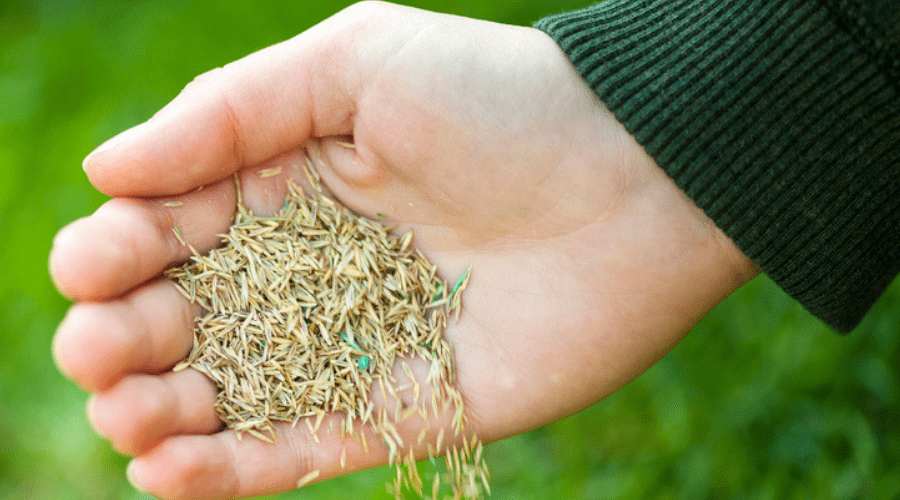If you’ve got a bare spot in the lawn and an old bag of grass seed in the shed, it may seem as though your troubles are over. Before sprinkling that seed and nurturing it with expensive lawn fertilizer, however, you should ask yourself how long can you store grass seed and how long has this been here? The germination rate of grass seed decreases with age so, while hope springs eternal, your grass seed may not.
Commons Questions
DOES GRASS SEED EXPIRE?
Grass seed often has an expiration date stamped on the bag and can go bad over time, so it's best to throw away any unused grass seed that is past its date. As grass seed ages the percentage of seeds that will be able to germinate decreases, forcing you to use more seed than normal to get adequate coverage. You may also spend hours irrigating, feeding, and nurturing seeds that will never produce grass.
HOW LONG CAN YOU STORE GRASS SEED?
According to the Scotts Company, grass seed is good for 2 to 3 years. Grass seed that is less than one year old is best, however. Storage also varies by seed type, with ryegrass seed staying viable for up to 5 years with proper storage. This allows rye to be stored longer than other popular varieties like fescue grass seed and bermudagrass seed.
HOW DO YOU STORE GRASS SEED?
Knowing how to properly store grass seed over the winter and beyond is crucial to getting good results from the seed. For best results, store your seed in a bag with mesh air vents that allow airflow while excluding insects. Keep the bag in a cool, dry place free of humidity. As a general rule, the Oregon State University Seed Laboratory recommends storing your seeds at temperatures below 60 degrees Fahrenheit and at a relative humidity of 60% or less. Cooler is better, but never let your seed freeze.
HOW WILL I KNOW IF MY SEED HAS EXPIRED?
There are no hard and fast signs that denote expired grass seed. Even the expiration date on the package is a guess and the seed may be viable after that date. There are a few instances, however, in which seed should simply be thrown away rather than used. Look over the seed carefully and see if there are patches of fungi or discoloration. Look for clumpy, damp areas as well, and take a sniff to see if your seed is harboring any strange or foul odors. If any of these conditions are present, it will be best to start with a fresh seed. If not, you can attempt to sow the seeds with the understanding that they may or may not germinate well depending on their age.
YOUR BEST CHANCE OF STORAGE SUCCESS
If you know you’ll be storing at least some of the grass seed you buy, buying well is the first step to proper storage. Find and purchase the seed with the expiration date furthest away just as you do when you buy milk at the grocery store. This video shows you exactly where and why to look for this date. Buying high-quality seed will also increase your odds of successfully storing any unused portion. The high-quality seed will contain the following, which should be listed on the package:
• Less than 0.5% weeds • No noxious weeds • Filler material such as chaff or dirt in quantities less than 2% • No more than 2% other crops
YOUR BEST CHANCE OF SOWING SUCCESS
It’s always important to give your grass seed the best possible start in life, but the old seeds may require extra diligence. Be sure to water your seed twice a day to keep the top inch of soil moist until the seed germinates. Once germination occurs, water every day. When your grass reaches about 3 inches in height, begin mowing as you normally would. You can resume your normal watering schedule after you have mowed your new grass once or twice.
Make sure your seeds don’t dry out and avoid covering the seed with straw as it may harbor unwanted weeds. Instead, cover the seeds with a thin layer of lawns soil. Though fresher is always better when it comes to planting seeds, properly stored grass seed can be viable for 2 to 3 years. Some varieties, like ryegrass, will last even longer.
It is important to keep insects, rodents, and humidity away from your grass seed when storing it and make sure the seed isn’t allowed to freeze. Depending on how cold winter gets where you live, this makes storing unused seed in the garage or basement a better option than keeping it in a garden shed where temperatures are more likely to fluctuate. For best results both before and after storing seeds, always buy high-quality grass seed and take proper care of it for the first few weeks after sowing.

